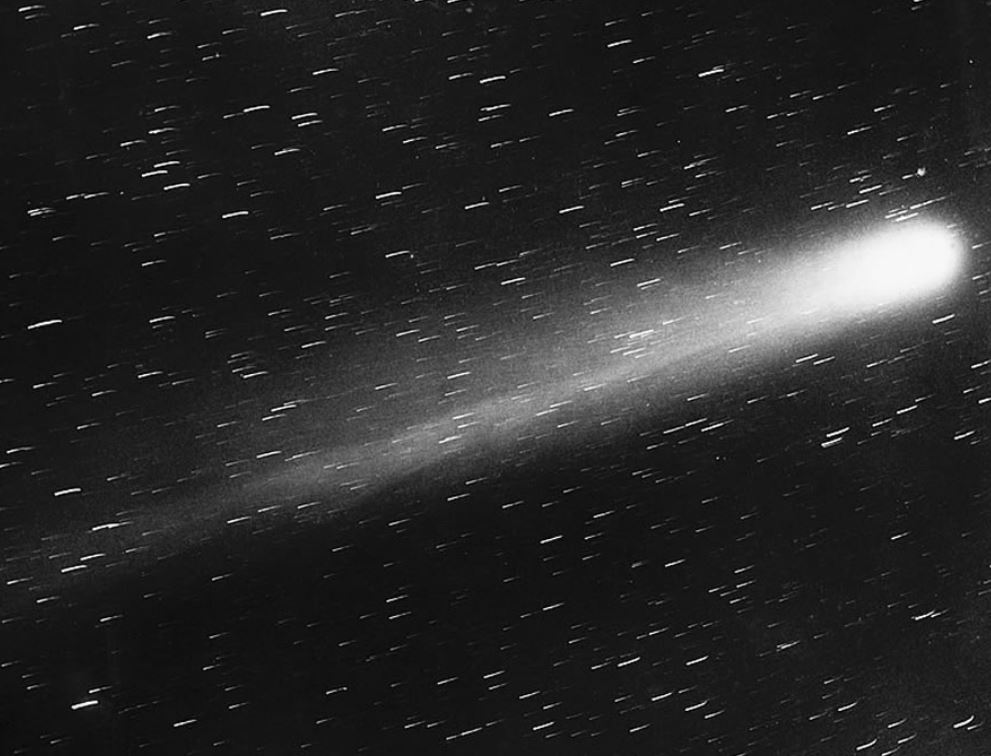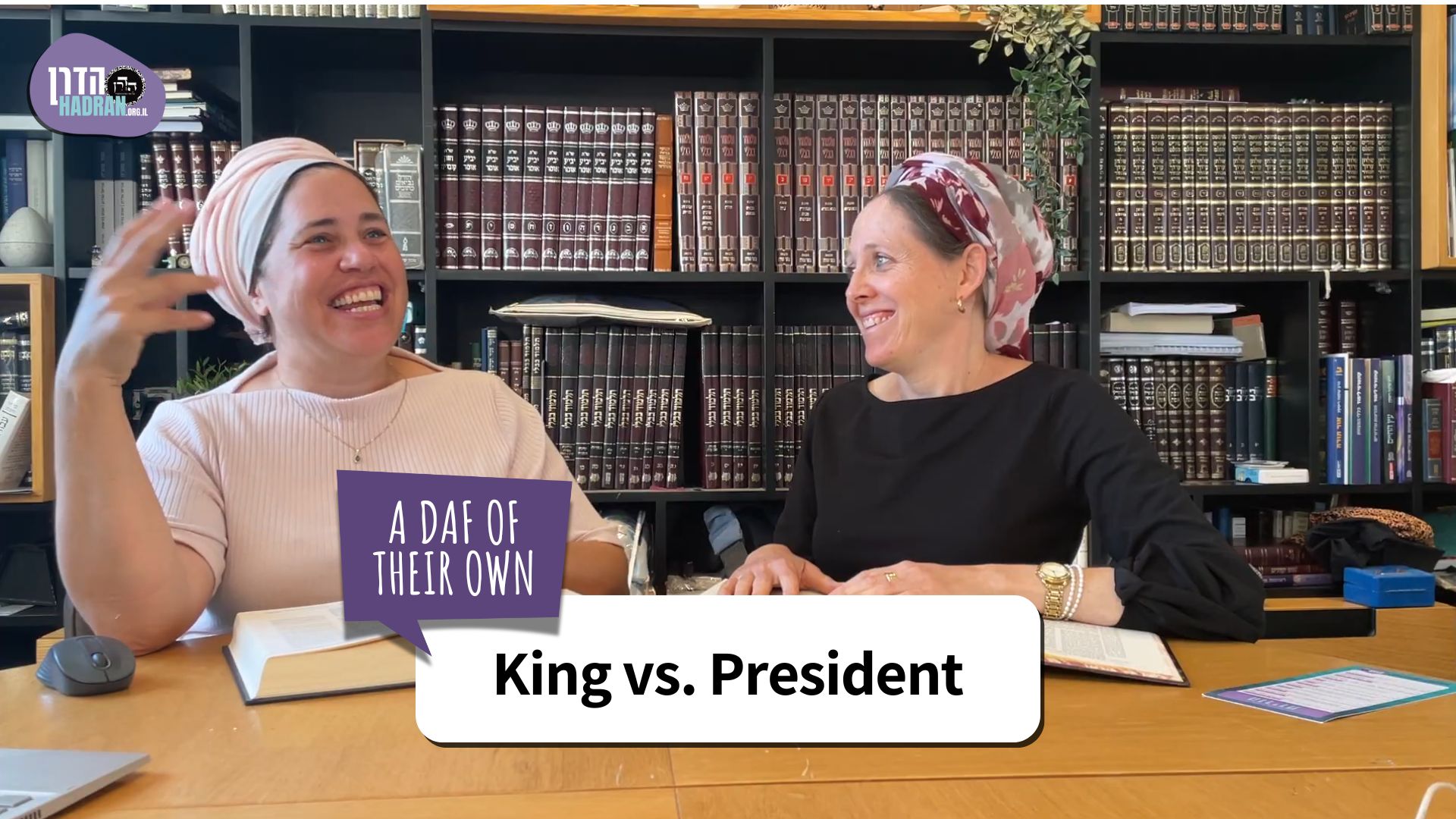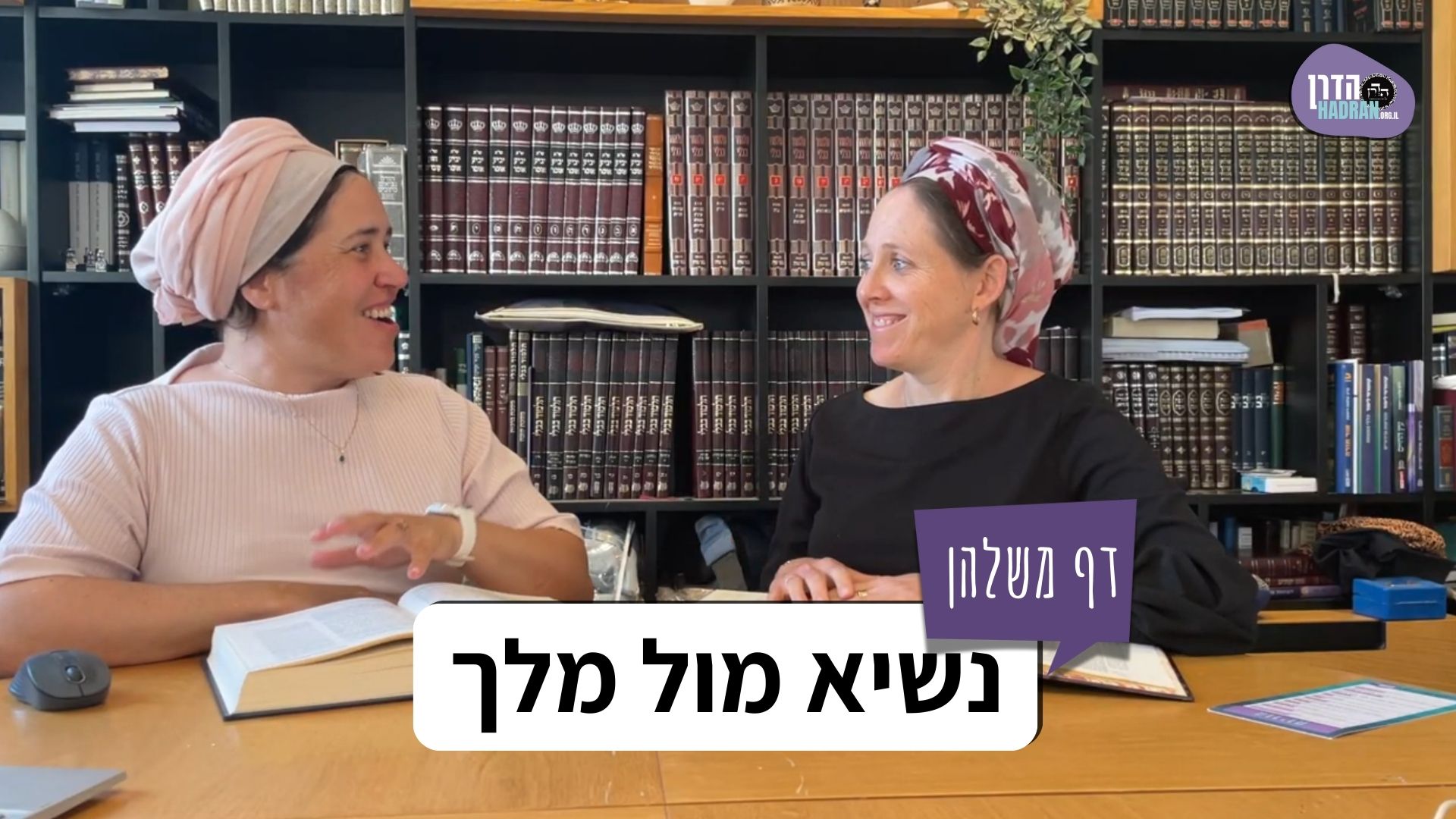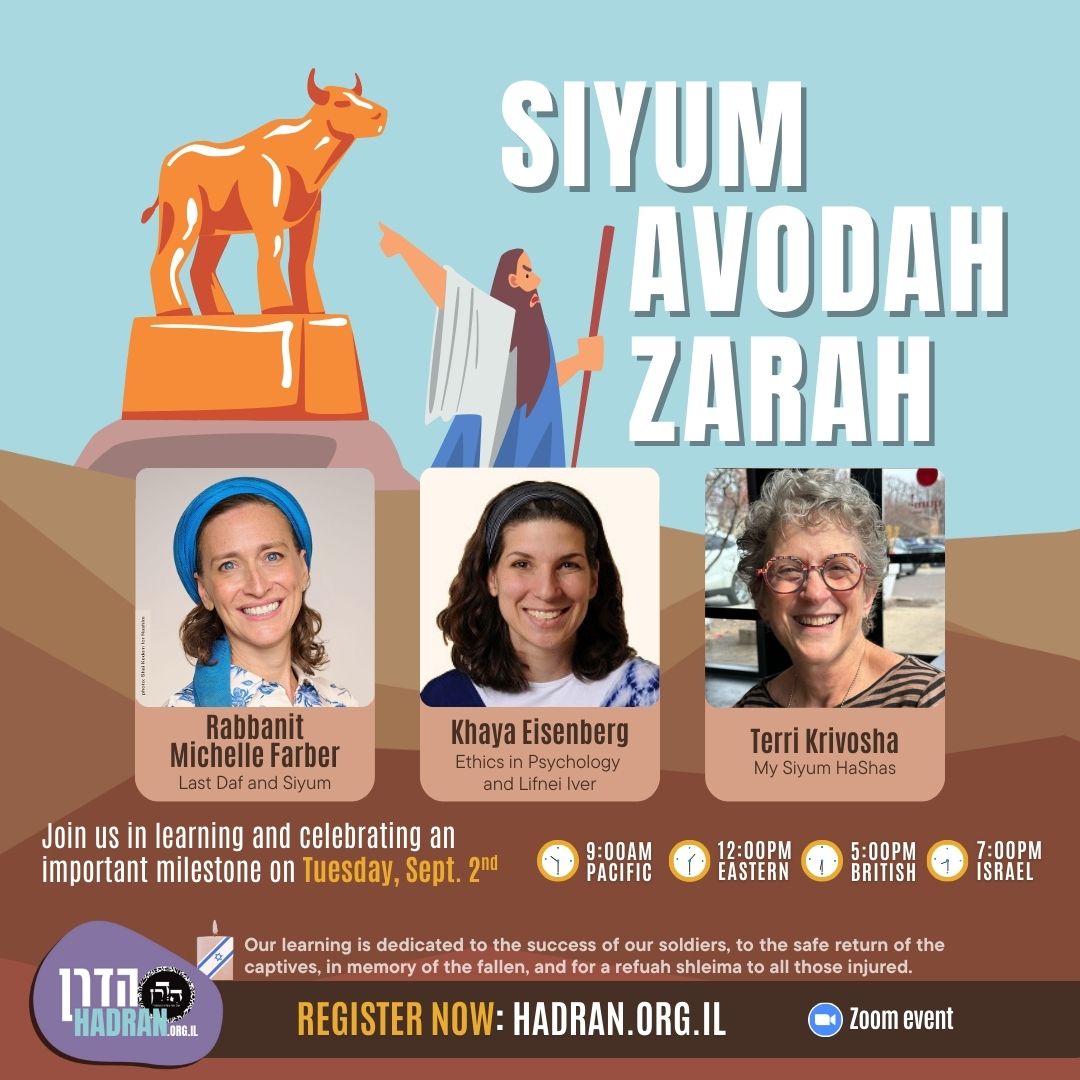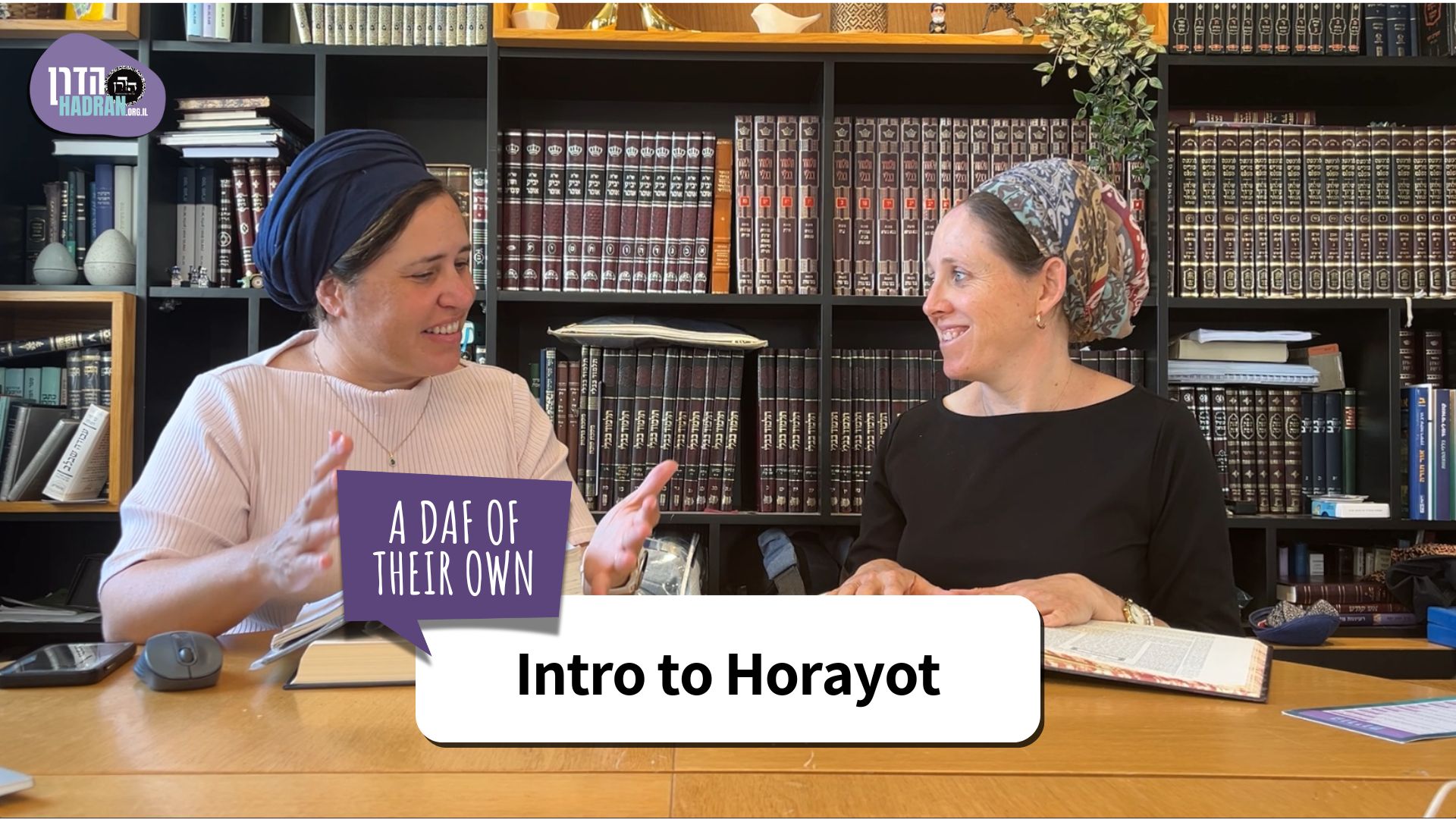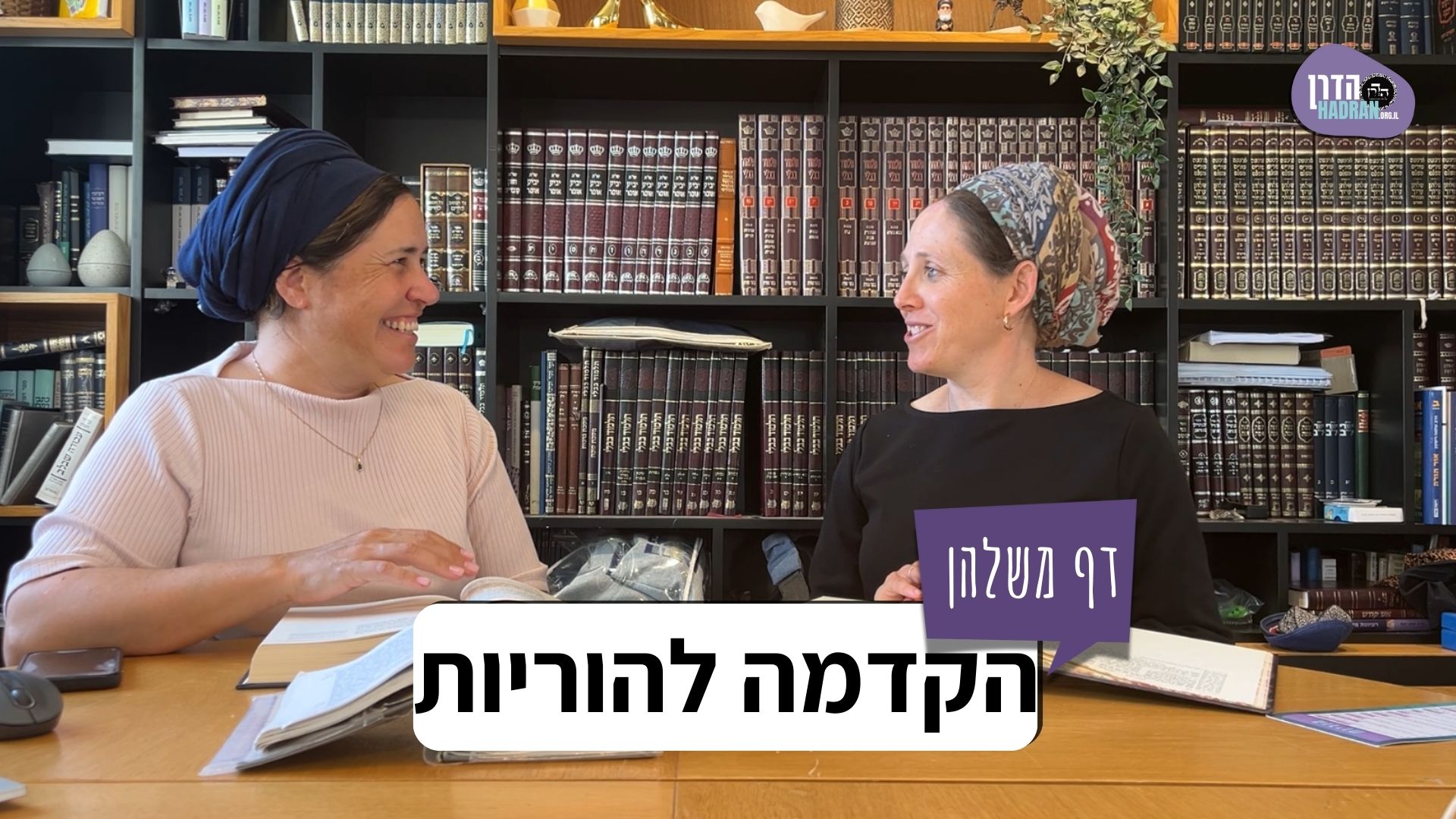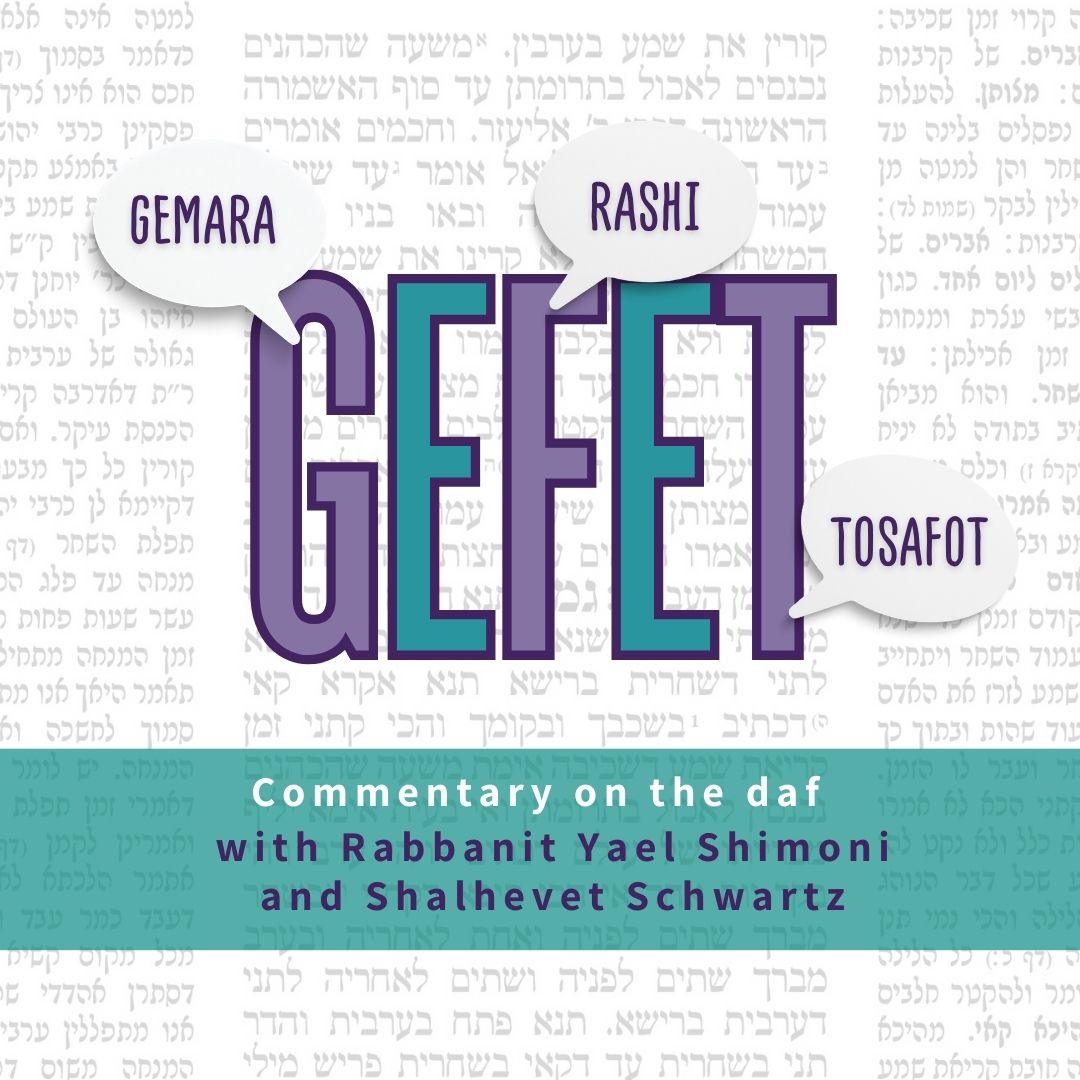What Torah was forgotten in the days of mourning for Moshe? Was it retrieved? Who was Otniel the son of Kenaz and what was his greatness? Are the five cases of sin offerings that are left to die applicable also to communal offerings?
This week’s learning is sponsored by Helen Danczak. “My dear uncle Phil passed on August 27 with family at hand. He was the kind of uncle that the kids (of all ages) gravitated to. I am not alone in saying he was my favorite uncle. He is missed. May his neshama have an aliyah.”
This week’s learning is dedicated by Medinah Korn in loving memory of her mother, Rosalie Katchen, Shoshana Raizl bat Avraham Yehoshua ve-Baila Toibe, z”l, on her 25th yahrzeit. She left a profound legacy for her family and many devoted friends who continue to learn from her to this day. Yehi zichra baruch.
Want to dedicate learning? Get started here:


This week’s learning is sponsored by Helen Danczak. “My dear uncle Phil passed on August 27 with family at hand. He was the kind of uncle that the kids (of all ages) gravitated to. I am not alone in saying he was my favorite uncle. He is missed. May his neshama have an aliyah.”
This week’s learning is dedicated by Medinah Korn in loving memory of her mother, Rosalie Katchen, Shoshana Raizl bat Avraham Yehoshua ve-Baila Toibe, z”l, on her 25th yahrzeit. She left a profound legacy for her family and many devoted friends who continue to learn from her to this day. Yehi zichra baruch.
Delve Deeper
Broaden your understanding of the topics on this daf with classes and podcasts from top women Talmud scholars.
New to Talmud?
Check out our resources designed to help you navigate a page of Talmud – and study at the pace, level and style that fits you.
The Hadran Women’s Tapestry
Meet the diverse women learning Gemara at Hadran and hear their stories.
Temurah 16
אָמַר רַב יוֹסֵף: דּוֹפִי שֶׁל סְמִיכָה קָתָנֵי.
Rav Yosef said in response: The baraita is not referring to a flaw due to some sin; rather, it is teaching about the flaw of the early dispute over the halakha of placing hands on the head of an animal brought as a Festival peace offering, as taught in tractate Ḥagiga (16a).
וְהָא יוֹסֵף בֶּן יוֹעֶזֶר גּוּפֵיהּ מִיפְלָיג פְּלִיג בִּסְמִיכָה! כִּי אִיפְּלִיג בַּהּ בְּסוֹף שְׁנֵיהּ, דִּבְצַר לִיבָּא.
The Gemara raises a difficulty: But Yosef ben Yo’ezer himself disputed the halakha of placing hands on the head of an offering. The first Sages to dispute this issue were Yosef ben Yo’ezer and Yosef ben Yoḥanan. The Gemara answers: When they disputed it, that was at the end of the years of Yosef ben Yo’ezer’s life, when the understanding of his heart was limited, due to old age. Therefore, the dispute is considered as though it occurred after his lifetime.
גּוּפָא, אָמַר רַב יְהוּדָה אָמַר שְׁמוּאֵל: שְׁלֹשֶׁת אֲלָפִים הֲלָכוֹת נִשְׁתַּכְּחוּ בִּימֵי אֶבְלוֹ שֶׁל מֹשֶׁה. אָמְרוּ לוֹ לִיהוֹשֻׁעַ: שְׁאַל! אָמַר לָהֶם: ״לֹא בַשָּׁמַיִם הִיא״.
The Gemara returns to the matter itself. Rav Yehuda says that Shmuel says: Three thousand halakhot were forgotten during the days of mourning for Moses. The Jewish people said to Joshua: Ask for guidance from Heaven so that you can reacquire the forgotten halakhot. Joshua said to them: “It is not in heaven” (Deuteronomy 30:12). Once the Torah was given on Sinai, the Sages of each generation must determine the halakha. No new halakhot may be added or subtracted by heavenly instruction or through prophecy.
אָמְרוּ לוֹ לִשְׁמוּאֵל: שְׁאַל! אָמַר לָהֶם: ״אֵלֶּה הַמִּצְוֹת״ — שֶׁאֵין הַנָּבִיא רַשַּׁאי לְחַדֵּשׁ דָּבָר מֵעַתָּה. אָמַר רַבִּי יִצְחָק נַפָּחָא: אַף חַטָּאת שֶׁמֵּתוּ בְּעָלֶיהָ נִשְׁתַּכְּחָה בִּימֵי אֶבְלוֹ שֶׁל מֹשֶׁה.
Many years later the Jewish people again said to Samuel: Ask for halakhic guidance from Heaven. He said to them: This is not possible, as the Torah states: “These are the commandments that the Lord commanded Moses to tell the children of Israel at Mount Sinai” (Leviticus 27:34). The word “these” indicates that from now on a prophet is not permitted to introduce any new element related to the Torah and its mitzvot through prophecy. With regard to the topic of the chapter, Rabbi Yitzḥak Nappaḥa says: Also, the halakha of a sin offering whose owner has died was one of those forgotten during the days of mourning for Moses.
אָמְרוּ לְפִנְחָס: שְׁאַל! אָמַר לָהֶם: ״לֹא בַשָּׁמַיִם הִיא״. אָמְרוּ לוֹ לְאֶלְעָזָר: שְׁאַל! אָמַר לָהֶם: ״אֵלֶּה הַמִּצְוֹת״, שֶׁאֵין נָבִיא רַשַּׁאי לְחַדֵּשׁ דָּבָר מֵעַתָּה.
At the time of Moses’ death, the people said to Pinehas: Ask for halakhic guidance from Heaven so that you can relearn the forgotten halakhot. Pinehas said to them: “It is not in heaven” (Deuteronomy 30:12). The people said to Elazar: Ask for halakhic guidance from God. He said to them that the verse states: “These are the commandments,” to teach that a prophet is not permitted to introduce any new element from now on.
אָמַר רַב יְהוּדָה, אָמַר רַב: בְּשָׁעָה שֶׁנִּפְטַר מֹשֶׁה רַבֵּינוּ לְגַן עֵדֶן, אָמַר לוֹ לִיהוֹשֻׁעַ: שְׁאַל מִמֶּנִּי כָּל סְפֵיקוֹת שֶׁיֵּשׁ לָךְ. אָמַר לוֹ: רַבִּי, כְּלוּם הִנַּחְתִּיךָ שָׁעָה אַחַת וְהָלַכְתִּי לְמָקוֹם אַחֵר? לֹא כָּךְ כָּתַבְתָּ בִּי ״וּמְשָׁרְתוֹ יְהוֹשֻׁעַ בִּן נוּן נַעַר לֹא יָמִישׁ מִתּוֹךְ הָאֹהֶל״? מִיָּד תָּשַׁשׁ כֹּחוֹ שֶׁל יְהוֹשֻׁעַ, וְנִשְׁתַּכְּחוּ מִמֶּנּוּ שְׁלֹשׁ מֵאוֹת הֲלָכוֹת, וְנוֹלְדוּ לוֹ שְׁבַע מֵאוֹת סְפֵיקוֹת, וְעָמְדוּ כׇּל יִשְׂרָאֵל לְהׇרְגוֹ.
§ Rav Yehuda says that Rav says: Just before the time when Moses, our teacher, left this world and went to the Garden of Eden, he said to Joshua: Ask from me all the cases of uncertainty in matters of halakha that you have, so that I can clarify them for you. Joshua said to him: My teacher, did I ever leave you for even one moment and go to another place? Didn’t you write this about me in the Torah: “But his minister, Joshua, son of Nun, a young man, did not depart out of the tent” (Exodus 33:11)? If I would have had any case of uncertainty I would have asked you earlier. Immediately after he said this, Joshua’s strength weakened, and three hundred halakhot were forgotten by him, and seven hundred cases of uncertainty emerged before him, and the entire Jewish people arose to kill him, as he was unable to teach them the forgotten halakhot.
אָמַר לוֹ הַקָּדוֹשׁ בָּרוּךְ הוּא: לוֹמַר לָךְ אִי אֶפְשָׁר, לֵךְ וְטוֹרְדֵן בְּמִלְחָמָה, שֶׁנֶּאֱמַר: ״וַיְהִי אַחֲרֵי מוֹת מֹשֶׁה עֶבֶד ה׳ וַיֹּאמֶר ה׳ וְגוֹ׳״.
The Holy One, Blessed be He, said to Joshua: It is impossible to tell you these halakhot, as the Torah is not in Heaven. But to save yourself from the Jewish people who want to kill you, go and exhaust them in war, so that they will leave you alone. As it is stated: “Now it came to pass after the death of Moses, the servant of the Lord, that the Lord spoke to Joshua, son of Nun, Moses’ minister, saying: Moses My servant is dead, now therefore arise, go over this Jordan” (Joshua 1:1–2). This shows that immediately after the death of Moses, God commanded Joshua to lead the nation into battle.
בְּמַתְנִיתִין תָּנָא: אֶלֶף וּשְׁבַע מֵאוֹת קַלִּין וַחֲמוּרִין, וּגְזֵירוֹת שָׁווֹת, וְדִקְִדּוּקֵי סוֹפְרִים נִשְׁתַּכְּחוּ בִּימֵי אֶבְלוֹ שֶׁל מֹשֶׁה.
§ It is taught in a baraita: One thousand and seven hundred a fortiori inferences, and verbal analogies, and minutiae of the scribes were forgotten during the days of mourning for Moses.
אָמַר רַבִּי אֲבָהוּ: אַף עַל פִּי כֵן הֶחְזִירָן עׇתְנִיאֵל בֶּן קְנַז מִתּוֹךְ פִּלְפּוּלוֹ, שֶׁנֶּאֱמַר: ״וַיִּלְכְּדָהּ עׇתְנִיאֵל בֶּן קְנַז אֲחִי כָלֵב וַיִּתֶּן לוֹ אֶת עַכְסָה בִתּוֹ לְאִשָּׁה״. וְלָמָּה נִקְרָא שְׁמָהּ ״עַכְסָה״? שֶׁכׇּל הָרוֹאֶה אוֹתָהּ כּוֹעֵס עַל אִשְׁתּוֹ.
Rabbi Abbahu says: Even so, Othniel, son of Kenaz, restored them through his sharp mind [pilpulo], as it is stated: “And Caleb said: To he who smites Kiriath Sefer, and takes it, to him will I give Achsah my daughter as a wife. And Othniel, son of Kenaz, the brother of Caleb, took it; and he gave him Achsah his daughter as a wife” (Joshua 15:16–17).The name “Kiriath Sefer,” which literally means the village of the book, is homiletically interpreted as a reference to those parts of the Torah that were forgotten, while the phrase “took it” is referring to Othniel’s acumen and learning. The baraita adds: And why is she called Achsah? The reason is that anyone who sees her became angry [ko’es] about his own wife, who was not as beautiful as Achsah.
וַיְהִי בְּבוֹאָה וַתְּסִיתֵהוּ לִשְׁאֹל מֵאֵת אָבִיהָ שָׂדֶה וַתִּצְנַח מֵעַל הַחֲמוֹר, מַאי ״וַתִּצְנַח״? אָמַר רָבָא אָמַר רַבִּי יִצְחָק: אָמְרָה לוֹ, מָה חֲמוֹר זֶה, כֵּיוָן שֶׁאֵין לוֹ מַאֲכָל בַּאֲבוּסוֹ — מִיָּד צוֹעֵק, כָּךְ אִשָּׁה, כֵּיוָן שֶׁאֵין לָהּ תְּבוּאָה בְּתוֹךְ בֵּיתָהּ — מִיָּד צוֹעֶקֶת.
The Gemara relates another incident involving Achsah. The verse states: “And it came to pass, when she came to him, that she persuaded him to ask of her father a field; and she alighted from off her donkey; and Caleb said to her: What do you want?” (Joshua 15:18). The Gemara asks: What is the meaning of: “And she alighted [vatitznaḥ],” which can also be understood as crying out? Rava says that Rabbi Yitzḥak says: Achsah said to Caleb: Just as in the case of this donkey, when it has no food in its trough it immediately cries out, so too in the case of a woman, when she has no produce in her house she immediately cries out.
וַתֹּאמֶר תְּנָה לִּי בְרָכָה כִּי אֶרֶץ הַנֶּגֶב נְתַתָּנִי, בַּיִת שֶׁמְּנוּגָּב מִכׇּל טוֹבָה, ״וְנָתַתָּה לִי גּוּלּוֹת מָיִם״ — אָדָם שֶׁאֵין בּוֹ אֶלָּא תּוֹרָה בִּלְבַד. ״וַיִּתֶּן לָהּ כָּלֵב אֵת גּוּלּוֹת עִלִּיּוֹת וְאֵת גּוּלּוֹת תַּחְתִּיּוֹת״ — אָמַר לָהּ: מִי שֶׁדָּר עֶלְיוֹנִים וְתַחְתּוֹנִים יְבַקֵּשׁ מִמֶּנּוּ מְזוֹנוֹת?!
The Gemara cites yet another verse involving Achsah: “And she said: Give me a blessing; for that you have set me in the land of the South [negev], and you have given me springs of water. And he gave her the upper springs and the lower springs” (Joshua 15:19). She said to her father: You have given me a home dried [menugav] of all goodness. “And you have given me springs of water”; this is referring to a man who has nothing other than Torah, which is metaphorically called water. But as he is unable to provide me with food, how can I live? “And gave her the upper springs and the lower springs.” Caleb said to her: Does someone learned in Torah, who dwells in the upper worlds and the lower worlds, require that sustenance be requested for him? He certainly does not need it, as God will provide for him in merit of his Torah studies.
וְכָלֵב בֶּן קְנַז הוּא? וַהֲלֹא ״כָּלֵב בֶּן יְפוּנֶּה״ הוּא! מַאי ״יְפוּנֶּה״? שֶׁפָּנָה מֵעֲצַת מְרַגְּלִים.
The Gemara asks: And Caleb, was he the son of Kenaz? Wasn’t he Caleb, son of Jephunneh (Joshua 15:13)? The Gemara explains that Jephunneh was not the name of his father, but a description of Caleb. What does the word Jephunneh mean? It means that he turned [sheppana] from the advice of the spies and did not join with them in their negative report about Eretz Yisrael.
וְאַכַּתִּי בֶּן קְנַז הוּא? בֶּן חֶצְרוֹן הוּא, דִּכְתִיב: ״וְכָלֵב בֶּן חֶצְרוֹן הוֹלִיד אֶת עֲזוּבָה״. אָמַר רָבָא: חוֹרְגֵיהּ דִּקְנַז הוּא.
The Gemara further asks: But still, was he the son of Kenaz? He was the son of Hezron, as it is written: “And Caleb, son of Hezron, begot children of Azubah his wife, and of Jerioth, and these were her sons: Jesher, and Shobab, and Ardon” (I Chronicles 2:18). Rava said: Caleb was actually the son of Hezron, but after his father passed away his mother remarried Kenaz, and consequently he was the stepson of Kenaz. Othniel, son of Kenaz, was therefore his maternal half brother.
תַּנָּא: הוּא עׇתְנִיאֵל, הוּא יַעְבֵּץ, וּמָה שְׁמוֹ? יְהוּדָה אָחִי שִׁמְעוֹן שְׁמוֹ. ״עׇתְנִיאֵל״ — שֶׁעֲנָאוֹ אֵל, ״יַעְבֵּץ״ — שֶׁיָּעַץ וְרִיבֵּץ תּוֹרָה בְּיִשְׂרָאֵל.
A tanna taught in a baraita: The same person is known as Othniel and he is also known as Jabez. And what is his actual name? Judah, brother of Simeon, is his name. He was known as Othniel, as God answered [ana’o El] his prayer. He was also known as Jabez [yabetz] because he advised and spread [ya’atz veribetz] Torah among the Jewish people.
וּמְנָלַן שֶׁעֲנָאוֹ אֵל? דִּכְתִיב: ״וַיִּקְרָא יַעְבֵּץ לֵאלֹהֵי יִשְׂרָאֵל לֵאמֹר אִם בָּרֵךְ תְּבָרְכֵנִי וְהִרְבִּיתָ אֶת גְּבוּלִי וְהָיְתָה יָדְךָ עִמָּדִי וַעֲשֵׂה מֵרָעָתִי לְבִלְתִּי עׇצְבִּי וַיָּבֵא אֱלֹהִים אֵת אֲשֶׁר שָׁאָל״.
The Gemara asks: And from where do we derive that God answered him? As it is written: “And Jabez called on the God of Israel, saying: If You will bless me indeed, and enlarge my border, and that Your hand may be with me, and that You will work deliverance from evil, that it may not pain me! And God granted him that which he requested” (I Chronicles 4:10).
אִם בֵּרַךְ תְּבָרְכֵנִי — בַּתּוֹרָה, ״וְהִרְבִּיתָ אֶת גְּבוּלִי״ — בְּתַלְמִידִים, ״וְהָיְתָה יָדְךָ עִמָּדִי״ — שֶׁלֹּא יִשְׁתַּכֵּחַ תַּלְמוּדִי מִלִּבִּי, ״וַעֲשֵׂה מֵרָעָתִי״ — שֶׁיִּזְדַּמְּנוּ לִי רֵיעִים כְּמוֹתִי, ״לְבִלְתִּי עׇצְבִּי״ — שֶׁלֹּא יְשַׂגְּבֵנִי יֵצֶר הָרָע מִלִּשְׁנוֹת. אִם אַתָּה עוֹשֶׂה כֵּן — מוּטָב, וְאִם לָאו — הֲרֵינִי הוֹלֵךְ (לִנְסִיסִי) [בִּנְסִיסִי] לַשְּׁאוֹל. מִיָּד, ״וַיָּבֵא אֱלֹהִים אֵת אֲשֶׁר שָׁאָל״.
The Gemara interprets this verse. The phrase: “If You will bless me indeed,” means that he prayed for a blessing with regard to Torah. “And enlarge my border,” means that he prayed for a blessing with regard to students. “And that Your hand be with me,” that my studies not be forgotten from my heart. “And that You will work deliverance from evil [mera’ati],” that I will find friends [re’im] like me. “That it may not pain me,” that the evil inclination should not grow stronger and prevent me from studying Torah. Othniel further prayed: If You do so, good; and if not, I will go depressed [linsisi] to my grave and the netherworld. Immediately, God answered him, as the verse states: “And God granted him that which he requested.”
כְּיוֹצֵא בַּדָּבָר אַתָּה אוֹמֵר: ״רָשׁ וְאִישׁ תְּכָכִים נִפְגָּשׁוּ מֵאִיר עֵינֵי שְׁנֵיהֶם ה׳״. בְּשָׁעָה שֶׁהַתַּלְמִיד הוֹלֵךְ אֵצֶל רַבּוֹ וְאוֹמֵר לוֹ: ״לַמְּדֵנִי תּוֹרָה״, אִם מְלַמְּדוֹ — ״מֵאִיר עֵינֵי שְׁנֵיהֶם ה׳״, וְאִם לָאו — ״עָשִׁיר וָרָשׁ נִפְגָּשׁוּ עוֹשֵׂה כֻלָּם ה׳״. מִי שֶׁעֲשָׂאוֹ חָכָם לָזֶה — עוֹשֶׂה אוֹתוֹ טִיפֵּשׁ, טִיפֵּשׁ לָזֶה — עוֹשֶׂה אוֹתוֹ חָכָם. זוֹ מִשְׁנַת רַבִּי נָתָן.
On a similar note, you say likewise with regard to the following verse: “The poor man and the oppressor [tekhakhim] meet together; the Lord gives light to the eyes of both of them” (Proverbs 29:13). When the student, who is poor in his knowledge, goes to his teacher, i.e., one who knows enough to teach but requires further enlightenment himself, as he is a man between [tokh] the levels of a Sage and a commoner, and says to him: Teach me Torah, if the teacher agrees to teach him, then the Lord gives light to the eyes of both of them, as they both become greater as a result. But if the teacher will not teach the student, then “the rich and the poor meet together; the Lord is the maker of them all” (Proverbs 22:2). This verse teaches that He Who made this one wise now makes him foolish, and He Who made that one foolish now makes him wise. This is the exposition of Rabbi Natan.
רַבִּי יְהוּדָה הַנָּשִׂיא אוֹמֵר: ״אִם בָּרֵךְ תְּבָרְכֵנִי״ — בִּפְרִיָּה וּרְבִיָּה, ״וְהִרְבִּיתָ אֶת גְּבוּלִי״ — בְּבָנִים וּבְבָנוֹת, ״וְהָיְתָה יָדְךָ עִמָּדִי״ — בְּמַשָּׂא וּבְמַתָּן, ״וְעָשִׂיתָ מֵרָעָתִי״ — שֶׁלֹּא יְהֵא בִּי מֵיחוֹשׁ רֹאשׁ וּמֵיחוֹשׁ אׇזְנַיִם וּמֵיחוֹשׁ עֵינַיִם, ״לְבִלְתִּי עׇצְבִּי״ — שֶׁלֹּא יְשַׂגְּבֵנִי יֵצֶר הָרָע מִלִּשְׁנוֹת. אִם אַתָּה עוֹשֶׂה כֵּן — מוּטָב, וְאִם לָאו — הֲרֵינִי הוֹלֵךְ בִּנְסִיסִי לַשְּׁאוֹל, ״וַיָּבֵא לוֹ אֱלֹהִים אֵת אֲשֶׁר שָׁאָל״.
Rabbi Yehuda HaNasi says an alternative interpretation of the prayer of Jabez: “If You will bless me indeed” means with procreation. “And enlarge my border” refers to blessing with sons and with daughters. “And that Your hand may be with me,” indicates in business. “And that You will work deliverance from evil,” so that I will not have a headache or an earache or an eye ache. “That it may not pain me,” that the evil inclination will not grow strong against me and prevent me from studying Torah. Jabez then said to God: If you do so, good; and if not, I will go depressed to my grave and the netherworld. Immediately, God answered him: And God granted him that which he requested.
כְּיוֹצֵא בַּדָּבָר אַתָּה אוֹמֵר: ״רָשׁ וְאִישׁ תְּכָכִים נִפְגָּשׁוּ מֵאִיר עֵינֵי שְׁנֵיהֶם ה׳״, בְּשָׁעָה שֶׁעָנִי הוֹלֵךְ אֵצֶל בַּעַל הַבַּיִת וְאָמַר: פַּרְנְסֵנִי, אִם מְפַרְנְסוֹ — מוּטָב, וְאִם לָאו — ״עָשִׁיר וָרָשׁ נִפְגָּשׁוּ עוֹשֵׂה כֻלָּם ה׳״, מִי שֶׁעֲשָׂאוֹ עָשִׁיר לָזֶה — עוֹשֶׂה אוֹתוֹ עָנִי, עָנִי לָזֶה — עוֹשֶׂה אוֹתוֹ עָשִׁיר.
On a similar note, you say an interpretation with regard to the verse: “The poor man and the oppressor meet together; the Lord gives light to the eyes of both of them” (Proverbs 29:13). When a poor person goes to a homeowner and says: Provide for me, if he provides for him, that is good. But if not, then it is stated: “The rich and the poor meet together; the Lord is the maker of them all” (Proverbs 22:2). This verse indicates that He Who made this one wealthy now makes him poor, and He Who made that one poor now makes him wealthy.
אָמַר רַבִּי שִׁמְעוֹן: מָה מָצִינוּ כּוּ׳.
§ The mishna taught that Rabbi Shimon says: Just as we found with regard to the offspring of a sin offering, and the substitute for a sin offering, and a sin offering whose owner died, that these matters apply to an individual sin offering but not to a communal sin offering, so too, with regard to a sin offering whose owner achieved atonement with another sin offering, and a sin offering whose year has passed, these matters are stated with regard to an individual sin offering but not with regard to a communal sin offering.
תָּנוּ רַבָּנַן: רַבִּי שִׁמְעוֹן אוֹמֵר: חָמֵשׁ חַטָּאוֹת מֵתוֹת, וְלַד חַטָּאת, וּתְמוּרַת חַטָּאת, וְחַטָּאת שֶׁמֵּתוּ בְּעָלֶיהָ, וְחַטָּאת שֶׁכִּפְּרוּ בְּעָלֶיהָ, וְחַטָּאת שֶׁעִיבְּרָה שְׁנָתָהּ.
The Sages taught in a baraita that Rabbi Shimon says: Five types of sin offerings are left to die, and one may not sacrifice them, and they are: An offspring born to a sin offering, i.e., if a female animal that was consecrated as a sin offering gave birth, its offspring is sacred but cannot be brought as an offering itself; and the substitution of a sin offering, if one substituted another animal for a sin offering, the same sanctity applies to it, but it cannot be sacrificed; and a sin offering whose owner has died; and a sin offering whose owner achieved atonement by sacrificing another offering; and a sin offering whose first year has passed, as a sin offering must be within its first year.
אִי אַתָּה יָכוֹל לוֹמַר וְלַד חַטָּאת בְּצִיבּוּר — לְפִי שֶׁאֵין חַטָּאת נְקֵבָה בְּצִיבּוּר, וְאִי אַתָּה יָכוֹל לוֹמַר תְּמוּרַת חַטָּאת בְּצִיבּוּר — לְפִי שֶׁאֵין צִיבּוּר עוֹשִׂין תְּמוּרָה, וְאִי אַתָּה יָכוֹל לוֹמַר חַטָּאת שֶׁמֵּתוּ בְּעָלֶיהָ בְּצִיבּוּר — לְפִי שֶׁאֵין הַצִּיבּוּר מֵתִים.
Rabbi Shimon continues: You cannot say that there could be an offspring of a sin offering in the case of a community, because there are no female sin offerings separated by the community. And likewise you cannot say that there could be a substitution for a sin offering in the case of a community, because a community cannot render a non-sacred animal that is exchanged for its consecrated one as a substitute. And furthermore, you cannot say that there could be a sin offering whose owners have died in the case of a community, because a community cannot die.
שֶׁכִּיפְּרוּ בְּעָלֶיהָ, וְשֶׁעִיבְּרָה שְׁנָתָהּ — לֹא מָצִינוּ. יָכוֹל יְהוּ נוֹהֲגוֹת בֵּין בְּיָחִיד בֵּין בְּצִיבּוּר?
With regard to communal offerings whose owners already achieved atonement and a communal offering whose first year has passed, we have not found a similarly clear indication of the halakha. Therefore, one might have thought that these two cases are in effect both for the offering of an individual and a communal offering.
אָמַרְתָּ: יִלְמַד אָדָם סָתוּם מִמְּפוֹרָשׁ, מָה מְפוֹרָשׁ בְּיָחִיד וְלֹא בְּצִבּוּר, אַף בְּשֶׁכִּיפְּרוּ בְּעָלֶיהָ וְשֶׁעִיבְּרָה שְׁנָתָהּ בְּיָחִיד דְּבָרִים אֲמוּרִים וְלֹא בְּצִיבּוּר.
But you must say: A person can learn with regard to a case in which certain details are not specified from a similar case where these details are specified. Just as with regard to those offerings whose details are specified, i.e., an offspring of a sin offering, a substitution for a sin offering, and a sin offering whose owner has died, the halakha that it dies applies only to an offering of an individual and not to a communal offering, so too, with regard to a sin offering whose owner achieved atonement, and a sin offering whose first year has passed, these matters are said with regard to the offering of an individual, but not with regard to a communal offering.
וְכִי דָּנִין אֶפְשָׁר מִשֶּׁאִי אֶפְשָׁר? רַבִּי שִׁמְעוֹן בְּחַד מָקוֹם גְּמִיר לְהוּ.
The Gemara asks: But can one derive the possible from the impossible? Those other cases include offerings that by definition do not apply to a community; how can one learn from them with regard to cases where they are possible? The Gemara answers: Rabbi Shimon learns this tradition as one unit, i.e., all the cases of sin offerings left to die are given as one halakha, and therefore there is no difference in their application.
אָמַר רֵישׁ לָקִישׁ: אַרְבָּעָה נִתְּנוּ לָהֶן, וְהֶעֱמִידוּם עַל חָמֵשׁ. וְאִי סָלְקָא דַעְתָּךְ בְּצִבּוּר — הָנָךְ מִי אִיתַנְהוּ בְּצִבּוּר? אֶלָּא עַל כׇּרְחָיךְ — יִלְמַד סָתוּם מִמְּפוֹרָשׁ.
Reish Lakish says in explanation of this matter: When Moses received this tradition at Sinai, the halakhot of four sin offerings that must be left to die were given to the Jewish people, whereas the fifth sin offering is left to graze until it develops a blemish. But as they did not know which of the sin offerings was the one that should be left to graze, they established these halakhot with regard to all five sin offerings, that they are all left to die. However, given that the four sin offerings were said together, either all four are communal sin offerings, or all four are sin offerings of the individual. And if it enters your mind that the four cases of sin offerings that must be left to die, as stated to Moses, referred to communal offerings, are all of these four sin offerings possible as communal offerings? Rather, the tradition is with regard to sin offerings of the individual. Rather, perforce one must derive the cases that are unspecified in terms of their halakhot from those cases that are specified.
רַבִּי נָתָן אוֹמֵר: אַחַת נִתְּנָה לָהֶן, וְהֶעֱמִידוּהָ עַל חָמֵשׁ.
Rabbi Natan says: Only one case of a sin offering that must be left to die was given to them at Sinai, while the other four sin offerings are left to graze until they develop a blemish. But as they did not know which was the sin offering that must be left to die, the Jewish people established it as applying to all five kinds of sin offering.
וְלִיחְזֵי בְּהֵי סִידְרָא גְּמִירִי לְהוּ, אִי בְּיָחִיד אִי בְּצִבּוּר?
The Gemara interrupts Rabbi Natan’s statement to raise a difficulty with regard to his explanation: But why didn’t the Jewish people first see with regard to which category they learned that a sin offering must be left to die, whether in reference to one of the three cases that are found only in the offering of an individual, or to one of the two cases that are also found in the offering of a community? If they knew which group of sin offerings must be left to die, they could have kept the other group in accordance with its original halakha, that it is left to graze.
שְׁתֵּי שִׁכְחָיוֹת שָׁכְחוּ, וְקַשְׁיָא לְהוּ.
The Gemara answers: They forgot two matters. They did not remember which of the five sin offerings must be left to die, and they also forgot to which category it applied, whether to a communal offering or an offering of an individual. And for this reason it was difficult for them, and they were forced to rule that all of these sin offerings must be left to die.
וְאִי סָלְקָא דַּעְתָּךְ בְּצִבּוּר, הָנָךְ מִי אִיתַנְהוּ בְּצִבּוּר? אֶלָּא שְׁמַע מִינַּהּ: יִלְמַד סָתוּם מִמְּפוֹרָשׁ — מַה מְפוֹרָשׁ בְּיָחִיד וְלֹא בְּצִבּוּר, אַף סָתוּם בְּיָחִיד וְלֹא בְּצִבּוּר.
The Gemara returns to its citation of the statement of Rabbi Natan, who proceeds to explain Rabbi Shimon’s opinion in the mishna in a similar manner to Reish Lakish: And if it enters your mind that the four cases of sin offerings that are left to graze, which were stated to Moses as one unit, involved communal offerings, are all of these five sin offerings applicable in the case of communal offerings? Rather, conclude from it that one learns the cases that are unspecified from those cases that are specified: Just as the specified cases apply only to an offering of an individual and not to a communal offering, so too, the cases that are not specified apply only to an offering of an individual, but not to a communal offering.
מַתְנִי׳ חוֹמֶר בַּקֳּדָשִׁים מִבַּתְּמוּרָה, וְחוֹמֶר בַּתְּמוּרָה מִבַּקֳּדָשִׁים. חוֹמֶר בְּקָדָשִׁים מִבַּתְּמוּרָה — שֶׁהַקֳּדָשִׁים עוֹשִׂין תְּמוּרָה, וְאֵין תְּמוּרָה עוֹשָׂה תְּמוּרָה. הַצִּבּוּר וְהַשּׁוּתָּפִין מַקְדִּישִׁין, אֲבָל לֹא מְמִירִין. וּמַקְדִּישִׁין עוּבָּרִין וְאֵבָרִים, אֲבָל לֹא מְמִירִין.
MISHNA: There is greater stringency with regard to sacrificial animals than there is with regard to a substitute, and greater stringency with regard to a substitute than there is with regard to sacrificial animals. The Mishna explains: There is greater stringency with regard to sacrificial animals than there is with regard to a substitute, as sacrificial animals render a non-sacred animal exchanged for them a substitute, but a substitute does not render a non-sacred animal exchanged for it a substitute. Furthermore, the community and the partners consecrate animals as offerings, but they do not substitute non-sacred animals for their offerings. And one consecrates fetuses in utero and one can consecrate an animal’s limbs, but one cannot substitute non-sacred animals for them.
חוֹמֶר בַּתְּמוּרָה מִבַּקֳּדָשִׁים, שֶׁהַקְּדוּשָּׁה חָלָה עַל בַּעֲלַת מוּם קָבוּעַ, וְאֵין יוֹצְאָה לְחוּלִּין
There is greater stringency with regard to a substitute than there is with regard to sacrificial animals, as, if one substituted a non-sacred blemished animal for an unblemished sacrificial animal, then the animal with a permanent blemish is imbued with inherent sanctity, which is not the case with regard to consecration. And in addition, those blemished animals consecrated through substitution do not emerge from their consecrated status to assume non-sacred status by means of redemption,


